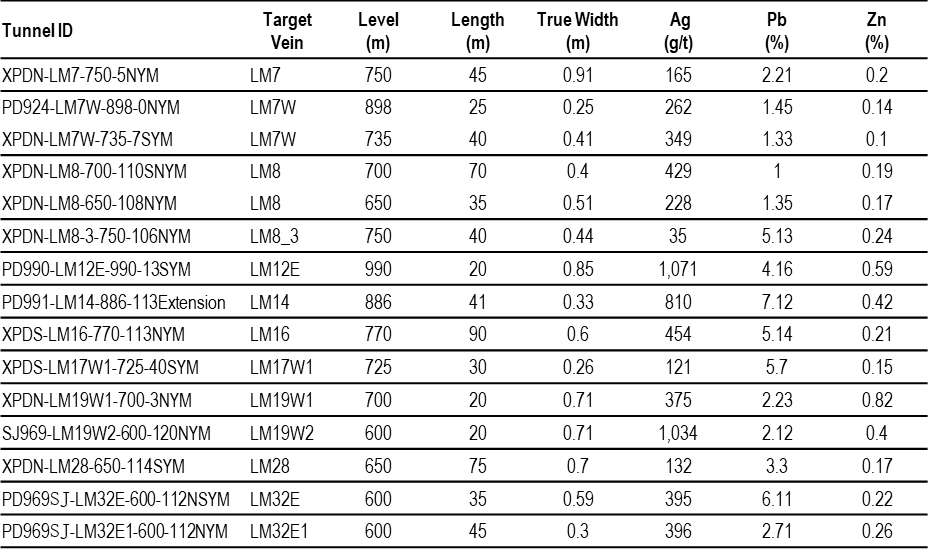VANCOUVER, British Columbia – June 26, 2018 – Silvercorp Metals Inc. (“Silvercorp” or the “Company”) (TSX / NYSE American: SVM) is pleased to report results of its exploration programs from July 1, 2017 to March 31, 2018 at the LMW mine, Ying Mining District, Henan Province, China. Results over the same period for the SGX, and TLP/LME mines in the Ying Mining District were respectively reported on June 8 and June 18, 2018.
Exploration program at the LMW mine consisted of 14,313 meters (“m”) underground diamond drilling and 5,151m exploration tunneling. Results of underground drilling continuously extended the major mineralized vein structures along strike and downdip and exploration tunneling exposed high grade mineralization zones within major production vein structures.
Highlights of selected intersections of drill holes:
- Hole ZKX113PA01 intersected a 2m interval from 53.21m to 55.21m, 1.20m true width, of vein W18 grading 3,363 grams per tonne (“g/t”) silver (“Ag”), 2.06% lead (“Pb”), and 0.21% Zn at the 962m elevation;
- Hole ZKX12263 intersected a 3.88m interval from 139.92m to 143.80m, 1.37m true width, of vein LM27 grading 778g/t Ag, 0.79% Pb and 0.16% Zn at the 520m elevation; and
- Hole ZKX11451 intersected a 3.37m interval from 108.54m to 111.91m, 2.87m true width, of vein LM31W grading 309g/t Ag, 8.26% Pb and 2.87% Zn at the 520m elevation.
The underground drilling program is conducted with 3 underground rigs from the current production levels to delineate the downdip and along-strike extensions of known mineralized vein structures in the production area and test for new veins in the previous less-explored areas.
The drilling program from July 1, 2017 to March 31, 2018 at LMW mine is briefly summarized in the following table:

*Including 7 holes completed in the first half of 2017; 1 hole drilled in the first quarter of 2018 with assay pending.
**Mineralized intersection in drill holes is defined by silver equivalent value (AgEq) greater than or equal to 130 g/t.
Highlights of selected mineralization zones exposed in exploration drift tunnels:
- Drift Tunnel XPDS-LM16-770-113NYM exposed mineralization of 90m long and 0.60m wide (true width) grading 454g/t Ag, 5.14% Pb and 0.21% Zn within vein structure LM16 on the 770m level;
- Drift Tunnel PD991-LM14-886-113Extension exposed mineralization of 41m long and 0.33m wide (true width) grading 810g/t Ag, 7.12% Pb and 0.42% Zn within vein structure LM14 on the 886m level; and
- Drift Tunnel XPDN-LM8-700-110SNYM exposed mineralization of 70m long and 0.40m wide (true width) grading 429g/t Ag, 1.00% Pb and 0.19% Zn within vein structure LM8 on the 700m level.
The exploration tunneling, comprising drifting, crosscutting and raising, was driven along and across major mineralized vein structures to upgrade drill defined mineral resources and test for new parallel and splay structures. Exploration tunneling of the 2017-2018 exploration program at LMW has been mainly conducted between elevation levels 500m and 1080m.
The tunneling program from July 1, 2017 to March 31, 2018 at LMW mine is briefly summarized in the following table:

*Mineralization is defined by silver equivalent value (AgEq) greater than or equal to 130 g/t.
Tables 1 and 2 below list the assay results of some selected mineralized intersections in drill holes and mineralized zones exposed in drift tunnels in the exploration programs from July 1, 2017 to March 31, 2018.

**Stepout: intersections adjacent to existing resource blocks for resource expansion*Test: intersections in open areas without known mineralization for new resource delineation

Quality Control
Drill cores are NQ size. Drill core samples, limited by apparent mineralization contact or shear/alteration contact, were split into halves by saw cutting. The half cores are stored in the Company’s core shacks for future reference and checking, and the other half core samples are shipped in security sealed bags to the Chengde Huakan 514 Geology and Minerals Test and Research Institute in Chengde, Hebei Province, China, 226 km northeast of Beijing, and the Zhengzhou Nonferrous Exploration Institute Lab in Zhengzhou, Henan Province, China. Both labs are ISO9000 certified analytical labs. For analysis the sample is dried and crushed to minus 1mm and then split to a 200-300g subsample which is further pulverized to minus 200 mesh. Two subsamples are prepared from the pulverized sample. One is digested with aqua regia for gold analysis with AAS, and the other is digested with two-acids for analysis of silver, lead, zinc and copper with AAS.
Channel samples are collected along sample lines perpendicular to the mineralized vein structure in exploration tunnels. Spacing between sampling lines is typically 5m along strike. Both the mineralized vein and the altered wall rocks are cut with continuous chisel chipping. Sample length ranges from 0.2m to more than 1m, depending on the width of the mineralized vein and the mineralization type. Channel samples are prepared and assayed with AAS at Silvercorp’s mine laboratory (Ying Lab) located at the mill complex in Luoning County, Henan Province, China. The Ying lab is officially accredited by the Quality and Technology Monitoring Bureau of Henan Province and is qualified to provide analytical service. The channel samples are dried, crushed and pulverized. A 200g sample of minus 160 mesh is prepared for assay. A duplicate sample of minus 1mm is made and kept at the laboratory archives. Gold is analysed by fire assay with AAS finish, and silver, lead, zinc and copper are assayed by two-acid digestion with AAS finish.
A routine quality assurance/quality control (QA/QC) procedure is adopted to monitor the analytical quality at each lab. Certified reference materials (CRMs), pulp duplicates and blanks are inserted into each lab batch of samples. QA/QC data at the lab are attached to the assay certificates for each batch of samples.
The Company maintains its own comprehensive QA/QC program to ensure best practices in sample preparation and analysis of the exploration samples. Project geologists regularly insert CRM, field duplicates and blanks to each batch of 30 core samples to monitor the sample preparation and analysis procedures at the labs. The analytical quality of the labs is further evaluated with external checks by sending about 3-5% of the pulp samples to higher level labs to check for lab bias.
Data from both the Company’s and the labs’ QA/QC programs are reviewed on a timely basis by project geologists.
Ruijin Jiang, P. Geo, reviewed the exploration data and prepared the scientific and technical information regarding exploration results contained herein. Guoliang Ma, P. Geo., Manager of Exploration and Resource of the Company, is the Qualified Person for Silvercorp under NI 43-101 and has reviewed and given consent to the technical information contained in this news release.
About Silvercorp
Silvercorp is a low-cost silver-producing Canadian mining company with multiple mines in China. The Company’s vision is to deliver shareholder value by focusing on the acquisition of under developed projects with resource potential and the ability to grow organically. For more information, please visit our website at www.silvercorp.ca.
For further information
Lorne Waldman
Senior Vice President
Silvercorp Metals Inc.
Phone: (604) 669-9397
Toll Free: 1(888) 224-1881
Email: [email protected]
Website: www.silvercorp.ca
CAUTIONARY DISCLAIMER – FORWARD LOOKING STATEMENTS
Certain of the statements and information in this press release constitute “forward-looking statements” within the meaning of the United States Private Securities Litigation Reform Act of 1995 and “forward-looking information” within the meaning of applicable Canadian provincial securities laws. Any statements or information that express or involve discussions with respect to predictions, expectations, beliefs, plans, projections, objectives, assumptions or future events or performance (often, but not always, using words or phrases such as “expects”, “is expected”, “anticipates”, “believes”, “plans”, “projects”, “estimates”, “assumes”, “intends”, “strategies”, “targets”, “goals”, “forecasts”, “objectives”, “budgets”, “schedules”, “potential” or variations thereof or stating that certain actions, events or results “may”, “could”, “would”, “might” or “will” be taken, occur or be achieved, or the negative of any of these terms and similar expressions) are not statements of historical fact and may be forward-looking statements or information. Forward-looking statements or information relate to, among other things: the price of silver and other metals; the accuracy of mineral resource and mineral reserve estimates at the Company’s material properties; the sufficiency of the Company’s capital to finance the Company’s operations; estimates of the Company’s revenues and capital expenditures; estimated production from the Company’s mines in the Ying Mining District; timing of receipt of permits and regulatory approvals; availability of funds from production to finance the Company’s operations; and access to and availability of funding for future construction, use of proceeds from any financing and development of the Company’s properties.
Forward-looking statements or information are subject to a variety of known and unknown risks, uncertainties and other factors that could cause actual events or results to differ from those reflected in the forward-looking statements or information, including, without limitation, risks relating to: fluctuating commodity prices; calculation of resources, reserves and mineralization and precious and base metal recovery; interpretations and assumptions of mineral resource and mineral reserve estimates; exploration and development programs; feasibility and engineering reports; permits and licenses; title to properties; property interests; joint venture partners; acquisition of commercially mineable mineral rights; financing; recent market events and conditions; economic factors affecting the Company; timing, estimated amount, capital and operating expenditures and economic returns of future production; integration of future acquisitions into the Company’s existing operations; competition; operations and political conditions; regulatory environment in China and Canada; environmental risks; foreign exchange rate fluctuations; insurance; risks and hazards of mining operations; key personnel; conflicts of interest; dependence on management; internal control over financial reporting as per the requirements of the Sarbanes-Oxley Act; and bringing actions and enforcing judgments under U.S. securities laws.
This list is not exhaustive of the factors that may affect any of the Company’s forward-looking statements or information. Forward-looking statements or information are statements about the future and are inherently uncertain, and actual achievements of the Company or other future events or conditions may differ materially from those reflected in the forward-looking statements or information due to a variety of risks, uncertainties and other factors, including, without limitation, those referred to in the Company’s Annual Information Form for the year ended March 31, 2017 under the heading “Risk Factors”. Although the Company has attempted to identify important factors that could cause actual results to differ materially, there may be other factors that cause results not to be as anticipated, estimated, described or intended. Accordingly, readers should not place undue reliance on forward-looking statements or information.
The Company’s forward-looking statements and information are based on the assumptions, beliefs, expectations and opinions of management as of the date of this press release, and other than as required by applicable securities laws, the Company does not assume any obligation to update forward-looking statements and information if circumstances or management’s assumptions, beliefs, expectations or opinions should change, or changes in any other events affecting such statements or information. For the reasons set forth above, investors should not place undue reliance on forward-looking statements and information.
